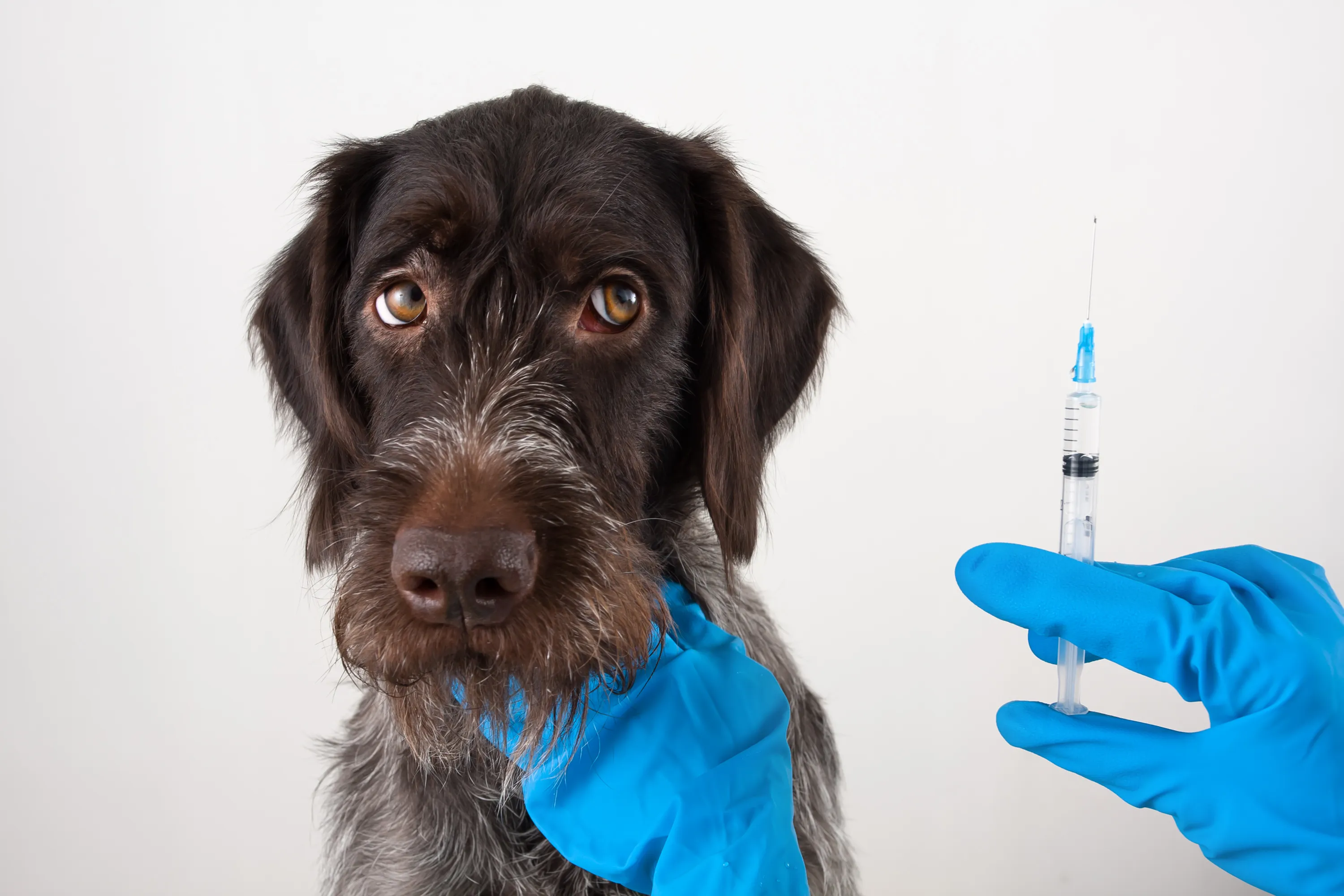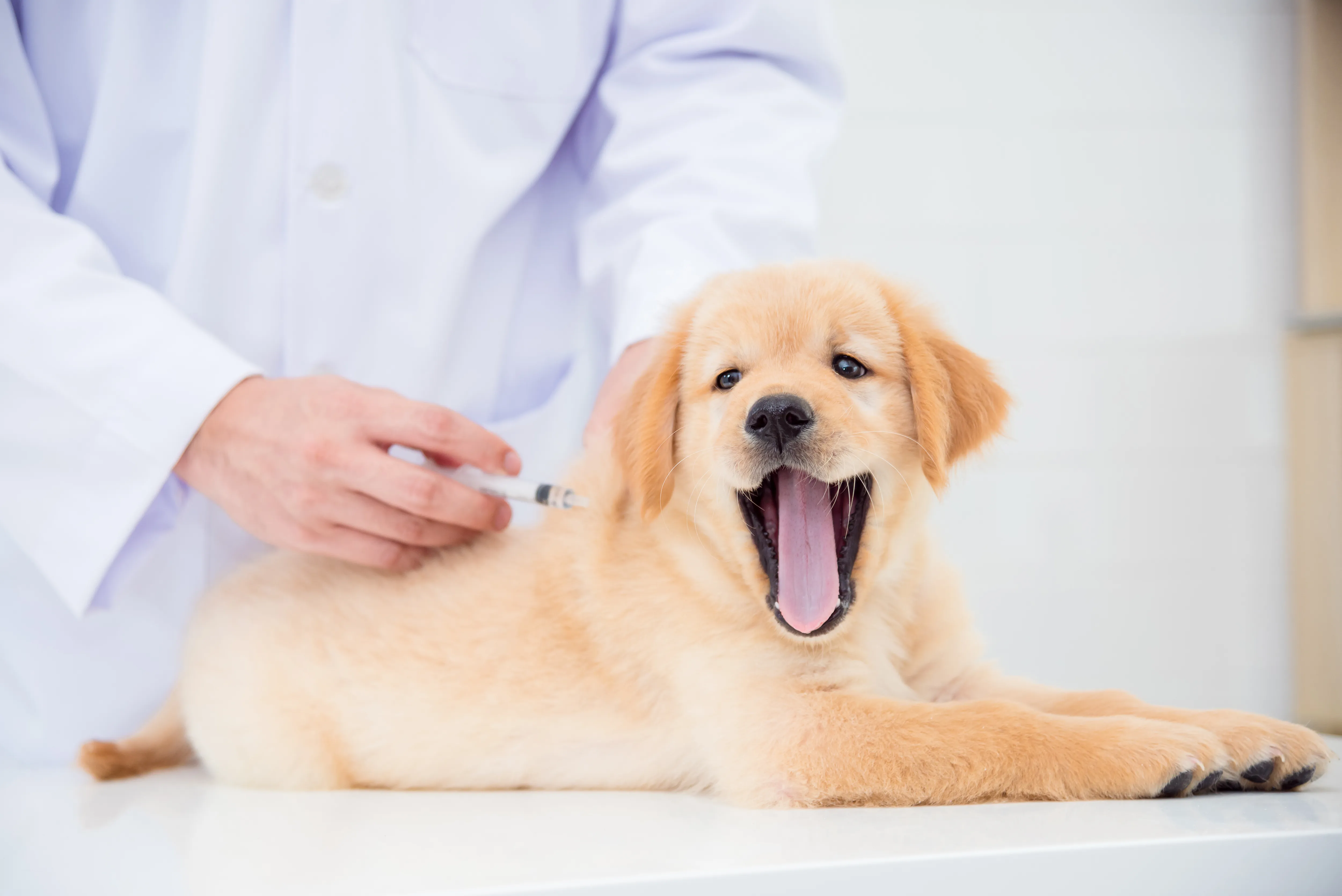Vaccinating my dog: duties, recommendations and costs
Vaccinations are one of the most important measures to protect your dog from dangerous infectious diseases. In this article, we would like to give you a clear overview and clarify important questions: How do vaccinations actually work? What vaccinations are there for dogs? And how often should my dog be vaccinated?

How does a vaccination work?
A vaccination basically works like training for the immune system. The body is brought into contact with harmless or weakened components of a pathogen. The immune system recognizes these and reacts by producing antibodies (the body's own antibodies). If the dog later comes into contact with the real pathogen, the immune system remembers it and can react immediately and fight the pathogen. The disease does not break out in the first place or runs a much milder course. In this way, your dog is protected without ever actually having been ill. Without vaccination, the dog first has to develop the antibodies itself. This takes longer and your furry friend can become ill during this time.
Which vaccinations are recommended?
In veterinary medicine, a distinction is made between core vaccinations (recommended for all dogs) and non-core vaccinations (depending on the circumstances).
Core vaccinations:
- Canine distemper virus: Causes severe and often fatal diseases of the respiratory tract and nervous system.
- Canine adenovirus: Leads to inflammation of the liver and can be very dangerous for dogs.
- Canine parvovirus: Triggers a highly contagious and often fatal diarrheal disease in dogs, especially puppies.
Non-core vaccinations:
- Leptospirosis: A bacterial disease that is transmitted via the urine of rodents or via stagnant water. It mainly affects the kidneys and liver and is also a zoonosis, meaning it is also infectious to humans.
- Canine parainfluenza virus (kennel cough): This vaccination is particularly important for dogs that have frequent contact with other dogs, for example in dog schools, boarding kennels or at dog shows.
When should dogs be vaccinated for the first time?
The right time for the first vaccination is crucial. Puppies are usually vaccinated for the first time from the eighth week of life. Further vaccinations are then given at twelve and sixteen weeks. During this phase, the natural protection that puppies have received through their mother's milk wears off. This is precisely why it is so important to build up your own defenses at this age. A further booster vaccination is then necessary after six to twelve months to complete the basic immunization.

How often do dogs need to be vaccinated?
Once basic immunization has been completed, the responsibility remains to keep vaccinations up to date. During the annual health checks at the vet, it is decided which vaccinations make sense and when they should be refreshed. This ensures that your pet is always optimally protected. Vaccinations against distemper, canine adenovirus and parvovirosis are usually boosted every three years. Vaccinations against leptospirosis and kennel cough, on the other hand, are necessary every year, as the protection does not last as long.
Is vaccination compulsory in Switzerland?
There is no general vaccination requirement for dogs in Switzerland. Vaccinations are recommended by vets, but are voluntary. An important exception is the rabies vaccination. It is required for all trips abroad with dogs. Dogs may be vaccinated against rabies from the twelfth week of life. Anyone traveling with their dog to another country must be able to provide proof of a valid vaccination. When returning to Switzerland, proof is mandatory, even if the vaccination was not required in the vacation destination. You can find out which regulations currently apply on the website of the Federal Food Safety and Veterinary Office (FSVO).
How much does it cost to vaccinate a dog?
The cost of basic immunization varies from practice to practice. As a rule, they amount to around 60 to 90 francs per vaccination.
As Calingo is aware of the importance of preventive treatments, we also contribute to the cost of vaccinations with our dog insurance, in addition to other preventive treatments such as tartar removal.
Can a dog be "over-vaccinated"?
A vaccination is always a strain on the body. You should therefore follow the vet's recommendation as to when a booster is necessary. In this way, unnecessary strain can be avoided. Especially when vaccinating against distemper, it is important to keep an interval of at least three years. For certain vaccinations, for example against distemper, parvovirus and canine adenovirus, the antibody level in the blood can be measured. If this is still high enough, a vaccination can be postponed. The level only needs to be checked again the following year. Such a check is not possible for other vaccinations such as leptospirosis and kennel cough. These should therefore be repeated annually to ensure protection.
Are vaccinations also useful for older dogs?
Older dogs also benefit from vaccinations. With increasing age, the immune system becomes weaker and many dogs also suffer from diseases that make them more susceptible. Vaccinations help to reduce the risk of infections at this stage of life. Protection through vaccinations is therefore sensible and important for dogs of all ages.
Side effects of vaccinations for dogs
As with all medical interventions, side effects can also occur after a vaccination. These are caused either by the vaccine itself or by so-called adjuvants, which are added to the vaccine. Small dogs in particular, weighing less than ten kilograms, are more frequently affected by side effects, as they receive the same amount of vaccine as large dogs. Side effects such as tiredness, itching or local swelling therefore occur more frequently in them. Slight edema in the head area, occasional vomiting or diarrhea are also possible. If several vaccinations are administered at the same time, the risk of side effects increases. In most cases, however, these symptoms subside quickly. However, a vet should be consulted immediately in the event of unusually severe or persistent reactions.
.webp)
Our tip: Do you have questions about vaccinations? Your dog is showing symptoms after vaccination and you want to make sure that everything is okay?
As a Calingo customer, you have the opportunity to chat or call a vet online from the comfort of your own home, free of charge. The online vet advice service supports you with questions about vaccinations and all other animal health issues.
Why is it important to vaccinate my dogs?
Vaccinations are one of the most effective measures to prevent infectious diseases. They not only protect the individual dog, but also help to contain the spread of dangerous diseases in the entire dog population. The more dogs are vaccinated, the lower the risk of diseases occurring or spreading. In addition, vaccinations are often a prerequisite for travel, as many countries refuse entry without a valid vaccination.
Conclusion
Vaccinations are an important precaution for your dog's health. They protect against dangerous diseases, make traveling easier and help to contain infectious diseases overall. Regular visits to the vet for advice will ensure that your dog has the best possible protection at all times.
Yes - vaccinations protect your dog from infectious diseases and help to reduce their overall spread. The more dogs are vaccinated, the lower the risk of disease and infection for everyone.
Yes, there may be side effects such as tiredness, itching, local swelling and occasionally vomiting or diarrhea. Side effects are particularly common in small dogs. If symptoms do not subside quickly or are severe, you should contact your vet immediately.
Mild diarrhea can occur as a temporary vaccination reaction and usually subsides quickly. Keep an eye on your dog - if the symptoms are severe or persistent, contact your vet immediately.
Rabies vaccination is compulsory for trips abroad; vaccination is permitted from the 12th week of life and proof is mandatory on return to Switzerland. Find out about the current FSVO requirements before every trip.
After the basic immunization (8th, 12th and 16th week plus booster after 6-12 months), you decide at the annual health check what is due. Distemper, adenovirus and parvovirosis are usually boostered every three years; leptospirosis and kennel cough every year.
From pet parents for pet parents
The health of your furry nose is our job









